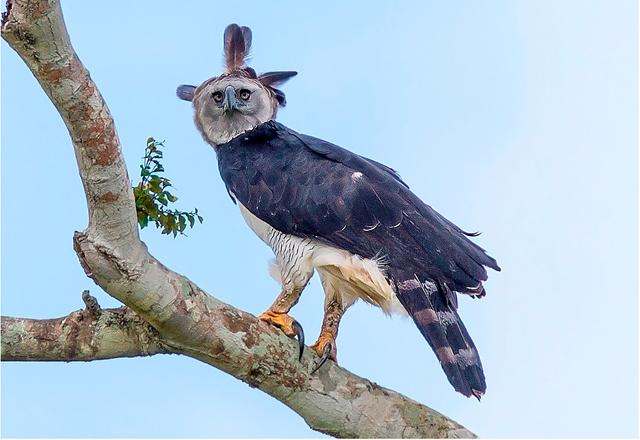- Mix
- Web-2021-08-18 | 05:50 pm

Nayrouz News Agency :
Harpy eagles in deforested areas of the Amazon may be among the world’s largest and most powerful birds, but they are struggling to feed their young as their habitat is destroyed, researchers recently warned.
The long-lived eagles, with legs almost as thick as a human wrist and claws as big as a hand, feed mainly on sloths and monkeys that they catch in the forest canopy.
Their talons can "perforate the skull of the largest primates in the Americas”, said researcher Everton Miranda of the University of KwaZulu-Natal, who said looking at the raptors was like "looking in the eyes of natural selection itself”.
But a new study he led shows the devastating impacts humans have wrought on the birds, which tend to remain in one nesting site for decades.
Researchers set up camera traps and identified bone fragments at 16 eagle nests in the Mato Grosso area of the Brazilian Amazon.
They found that eagles cannot find enough food if their territory is deforested above 50 per cent.
Eaglets starved in their nests in areas of severe forest loss.
While previous research has suggested harpy eagles can switch to other prey, such as armadillos, when they face food shortages, the latest study found no such switching to hunt other animals.
Miranda said this is partly because the birds, which are listed as "near threatened” by the International Union for Conservation of Nature, need forest cover and plenty of prey in the tree canopy to thrive.
Of 306 prey remains, nearly half were two-toed sloths, brown capuchin monkeys and grey woolly monkeys.
Once common from southern Mexico to Argentina, the total population of harpy eagles has shrunk more than 40 per cent since the 19th century, with habitat loss and shooting among the biggest causes.
No alternative prey
The study, published in the journal Scientific Reports, said 93 per cent of their distribution range is now within Amazonian forests.
The apex predators, which weigh up to about 7.3 kilogrammes for females and 5.9kg for males, can live for decades, with one wild-caught individual recorded at 54 years old, according to the study.
Their breeding cycle lasts up to a year and a half, during which they lay two eggs but fledge only a single eaglet.
The eagles have been known to breed at the same t-shaped nest tree for several decades, the study said, though it noted these "trees are typically of commercial interest to the logging industry”.
In deforested areas, the authors saw that instead of switching to alternative prey, the eagles returned with their normal food less frequently.
Three eaglets starved in landscapes where deforestation was between 50-70 per cent. In areas where the rate of deforestation was over 70 per cent, no nests were found.
This suggests that broader declines in harpy eagle populations are driven by "prey scarcity derived from habitat loss, which is caused by cattle ranching”, Miranda told AFP.
He said it was only after checking the camera trap data that they realised the eagles were under "severe food stress”.
The researchers estimate that deforestation means that around 35 per cent of northern Mato Grosso is now unsuitable for breeding harpy eagles.
The long-term survival of the harpy eagles depends on forest conservation and Miranda said this would need forest fragments to be reconnected as well as "real action from the government to prevent illegal deforestation”.
In the short term he said groups should give food to starving eaglets.
"Nowadays, when we monitor individuals under food stress, we offer them supplementary food if required,” he said.










